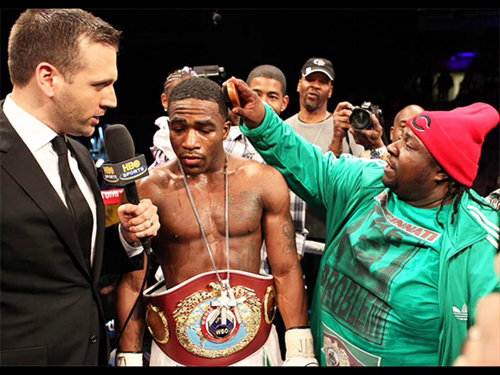
In a profession as physically and psychologically arduous as boxing, participants tend to peak later in life than they do in many other sports. The toll exacted by a prizefighting career is one that unseasoned fighters are rarely equipped to handle—boxers spend years inside the ring taking punches before they ever get a shot to earn a living at it, if they ever get a shot at all. More often than not, it’s the old guard that asserts itself whenever enterprising young upstarts make their move for the real money. But as boxing continues to lose ground in the increasingly fragmented landscape of sports entertainment, it is clear that the business is in desperate need of some new blood.
Floyd Mayweather, the most bankable pay-per-view attraction of the past decade, is 36 years old and has stated—if such a declaration from Floyd can be taken at face value—that the six-fight contract he signed with Showtime earlier this year will be his last. Manny Pacquiao is 34, an acting congressman in the Philippines and coming off a crushing knockout loss to longtime rival Juan Manuel Marquez in December. Undisputed middleweight champion Sergio Martinez is 38 and has a surgically repaired knee and a twice-broken left hand to show for his last year of action. Wladimir and Vitali Klitschko each still have a foot planted firmly on the neck of the heavyweight division, but the brothers are 37 and 42, respectively, and began laying the groundwork for their post-fight vocations several years ago.
If the prizefighting industry is to evolve beyond the periodic novelty cash-grab it has become over the last 20 years (though there is no evidence that the sanctioning organizations currently in charge of staging professional boxing matches have any desire to evolve), it will need a steady stream of fresh talent to promote. There are a few candidates who just might be up to the task.
On the surface, 27-year-old Brandon Rios is exactly the sort of fighter that the casual fan has been waiting for. He provides the portion of the pugilistic experience that passersby long to witness, even if they’re hesitant to admit it—the primitive vicarious release that comes when blood spills onto the canvas. Rios hails from west Texas and has been fighting out of Oxnard, Calif., since wiping out Raul Montes in the third round in his first professional fight in 2004. Now with a record of 31 wins, one loss and a draw, the years have done nothing to temper his reputation as a wholly unrepentant brawler—Rios has 23 knockouts, but he has practically tripped over his own feet at times in his attempt to end every fight that way. His seventh-round stoppage of Mike Alvarado last October was named fight of the year by Sports Illustrated, and their equally savage rematch in March—a unanimous victory for Alvarado—is among the favorites for the distinction this year. Rios’ recklessness will be put to the test against another legendary brawler when he takes on Pacquiao in November.
At 23 years old, junior middleweight bruiser Saul “Canelo” Alvarez has been a celebrity in boxing-mad Mexico for years already, making his professional debut at age 15. He has amassed a record of 42 wins and one draw, which had come against mostly anonymous competition before he rolled to a unanimous decision over faded former champion Shane Mosley a year ago. Canelo stepped up the competition from there, stopping Josesito Lopez in the fifth round of their bout in September and following it with a clear decision against Austin Trout. Though his movement is much closer to a trudge than a dance, he’s always just one rib-caving body shot away from a knockout. Canelo’s next fight could be a career-maker—he’ll serve as Mayweather’s 45th opponent.
If Canelo is being advertised as the next in line, Adrien Broner would have you believe that he is already there. The 24-year-old Cincinnati native has logged significantly fewer rounds than Canelo but has an impeccable 27-0 record since turning pro in 2008. Quick, gifted and unrelentingly brash, he is viewed by many as the spiritual and stylistic successor to Mayweather, a designation that Broner has made no effort to dispute. His speed and movement are his most obvious assets, but Broner has knockout power as well—none of which has been lost as he’s moved up in weight. Broner went from junior lightweight to lightweight in November, then skipped a division to win a title in his welterweight debut against Paulie Malignaggi last month. Needless to say, he’s already looking ahead to the next big score.

